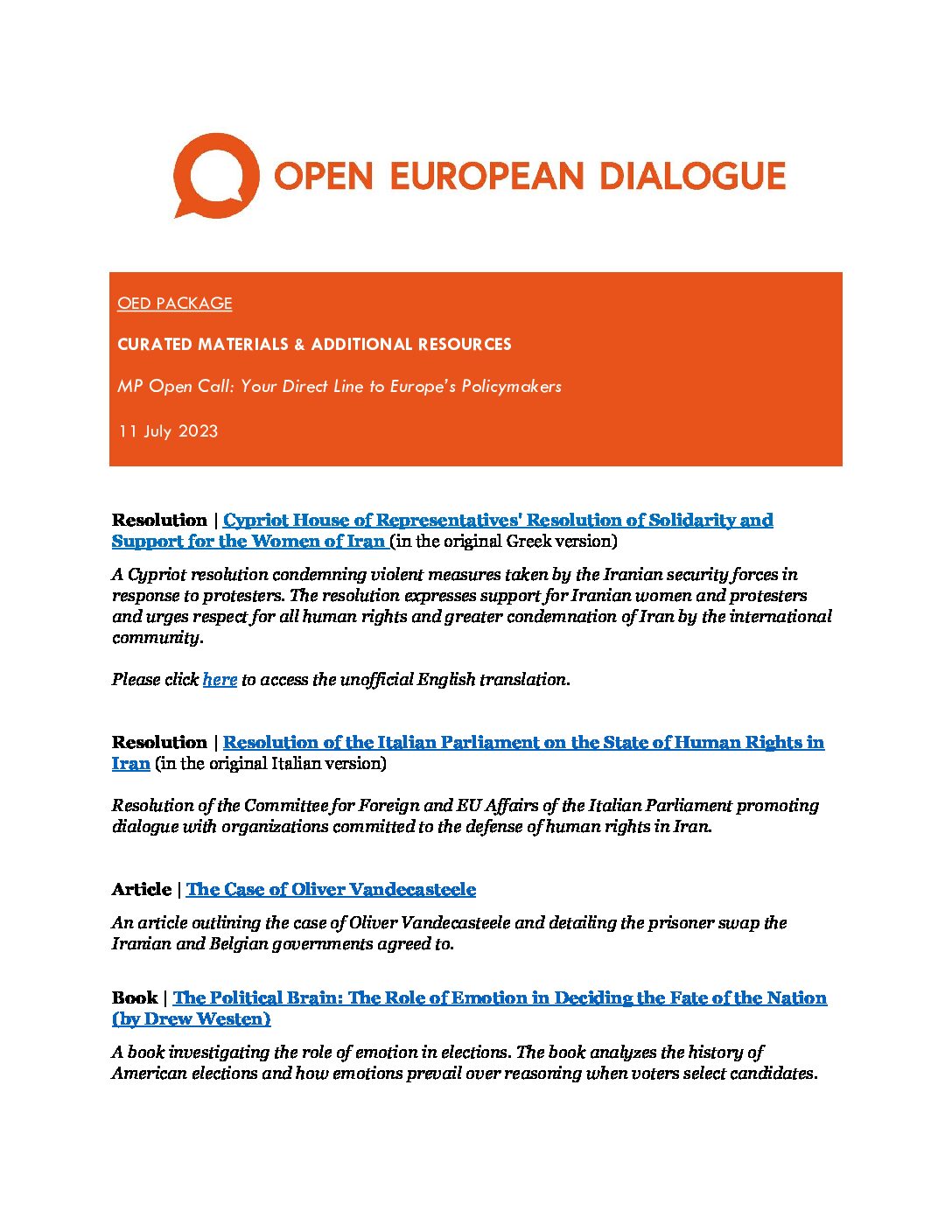
MP Open Call: Your Direct Line to Europe’s Policymakers #18
The Open European Dialogue is committed to strengthening dialogue between policymakers across Europe by providing a neutral, informal, and accessible space for conversation. Our MP Open Calls grew out of this mission and are a space for parliamentarians to set the agenda, discuss pressing national and European issues, and support each other by sharing best practices and concerns.
Our activities are for Open European Dialogue network members only. Not a network member yet? Get in touch!
—
Our July MP Open Call was joined by parliamentarians from Belgium, Cyprus, Germany, Italy, Kosovo, Luxembourg, and Romania.
The call was an opportunity for participants to get feedback from other politicians on policy issues they are currently working on and exchange and learn about best practices in different European countries. During the exchange, the conversation focused on human rights violations in Iran, as well as related political initiatives and European responses to the issue, pinpointing a further discussion on the state of democracy and challenges posed to democratic systems in Europe and abroad.
HIGHLIGHTS OF THE CONVERSATION
DEMOCRATIC CHALLENGES
- European Responses to Iranian Human Rights Abuses
The violation of human rights by the Iranian government, in combination with the intense protests in Iran, has raised several questions for European policymakers. What are the most effective and efficient ways to sanction such behaviour? How can parliaments support dissent in autocratic countries? Which actors should democratic parliaments cooperate with?
The introduction of a resolution recently passed by the Cypriot House of Representatives helped kick-start the discussion outlining the approach taken by Cyprus towards the events in Iran: condemning the violent actions of the Iranian security forces and the Iranian government’s violation of human rights while simultaneously expressing support and solidarity with the Iranian protesters.
“This resolution calls on all the institutions of the European Union and its member states, as well as the international community in general, to condemn the actions of the Iranian government and exert substantial pressure on it, demanding its compliance with the UN Charter and other related resolutions of the international organization.”
- How to Combat Human Rights Abuses?
How should democratic parliaments and parties appropriately and effectively combat human rights abuses in Iran? The Cypriot resolution provided participants with an opportunity to introduce their own approaches to the issue.
The adoption of a more intensive, on-the-ground approach to investigating and exposing Iranian human rights abuses is recognized as a possible way forward.
“We encourage diplomatic actors to visit detention and prison facilities in Iran and observe the conditions prisoners are in and have ambassadors and diplomats raising awareness about the human rights abuses occurring in the country while exerting pressure on the Iranian government to change its behavior.”
The case of Olivier Vandecasteele, a Belgian aid worker falsely imprisoned in Iran on spying charges, highlighted the problematic nature of negotiating with autocratic regimes and specific groups. The most recent development of this case saw Vandecasteele released only after the Belgian government had agreed to release convicted terrorist Assadollah Assadi. There are mixed responses to this deal, accentuating that negotiating with and releasing terrorists remains a debated approach and a red line for many.
“Is it right to burn all bridges?”
“How do we find the space to be in dialogue with certain actors?”
- Difficulties in Countering the Iranian Regime
Which actors and organizations should be supported in combatting autocratic regimes? The difficulty that comes with supporting certain groups is the presence of many varied agendas, making many actors “reluctant to endorse” specific groups. However, there is an understanding that democratic actors and parliaments should extend their efforts towards strengthening Iranian civil society and maintaining existing ties and relationships with organizations acting in support of democratic values and processes.
- The Effects of Electoral Thresholds
Having discussed potential responses and challenges to combating human rights violations abroad, participants began focusing inwards on democratic issues affecting Europe.
What positive or negative effects do electoral thresholds have on democracy? Electoral thresholds have the potential to allow for the emergence of new parties into parliament, enhancing the democratic and diverse nature of government. In so doing, they are an important component and help shape countries’ party landscapes. Equally, they have the potential to simultaneously lead to the fragmentation of representation and the splintering of parliaments.
This dilemma encourages the development of alternative solutions, such as eliminating electoral thresholds at the national level but not a regional level of government or specifying conditions for parties to be eligible to enter parliament, such as the requirement that parties must have a certain number of members.
- Threats Posed by Hateful Rhetoric
An important discussion area remains the growing intensity of hateful rhetoric and the parties’ role in preserving accountability and safeguarding democratic principles.
There is an understanding that parties supportive of democracy must actively cooperate across party lines to tackle disinformation and the undermining of democratic values and practices. Participants were also keen to note difficulties alongside democratic processes in this sense by referring to the recent upheaval in Kosovo.
–
KEEP THE CONVERSATION GOING
Stay connected with your colleagues. The contact details of politicians who participated in this MP Open Call and those of all other Open European Dialogue members can be found in the members-only area of our website.
The Open European Dialogue is a network driven by members of parliament. We look forward to hearing from you and helping you as best we can to connect and work with your colleagues from across Europe.
